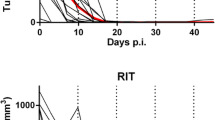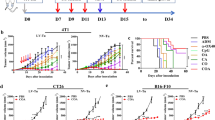Summary
A 6-thioguanine-resistant (TgR) variant of the metastatic mammary tumor 13762 was found to be very immunogenic. This TgR variant was nontumorigenic and nonmetastatic, whereas the parent 13762 cell line is very tumorigenic and metastatic in normal syngeneic animals. The TgR variant was tumorigenic in irradiated animals. The mechanism of the hosts' immune rejection of this TgR variant was investigated. A 51Cr-release cytotoxic cell assay was used to assess lymphocyte cell-mediated cytotoxicity (CMC) of tumor-draining lymph nodes and spleens from animals injected with tumor cells. In a secondary CMC response of splenic T cells from animals injected with TgR cells, there was a much stronger response as compared to animals injected with 13762 cells. This strong cytotoxic T cell response was short-term and correlated to the host rejection of TgR cells. Previously, we selected revertant cell lines (TgRrev, TgRrevM) from the TgR variant line that were more metastatic and tumorigenic. The revertant cell lines induced a lower CMC response than the TgR line, but a higher response compared to the parent 13762 line. The poor CMC response from 13762 tumorbearing animals was investigated and appeared to be due to a suppressor T cell response.
Similar content being viewed by others
References
Berendt MJ, North RJ (1980) T cell-mediated suppression of antitumor immunity. An explanation for the progressive growth of an immunogenic tumor. J Exp Med 151:69
Boon T (1983) Antigenic tumor cell variants obtained with mutagens. Adv Cancer Res 39:121
Boon T, Van Pel A (1978) Teratocarcinoma cell variants rejected by syngeneic mice: Protection of mice immunized with these variants and other variants and against the original malignant cell line. Proc Natl Acad Sci 75:1539
Boon T, Van Snick J, Van Pel A, Uyttenhove C, Marchand M (1980) Immunogenic variants obtained by mutagenesis of mouse mastocytoma P815 II: T lymphocyte-mediated lysis. J Exp Med 152:1184
Contessa AR, Bonmassar A, Giampietri A, Circola A, Goldin A, Fioretti MC (1981) In vitro generation of aighly immunogenic subline of L1210 leukemia following exposure to 5-(3,3-dimethyl-1-triazeno) imidazole-4-carboxamide. Cancer Res 41:2476
Dennis W, Donaghue TP, Kerbel RS (1981) Membrane-associated alterations detected in poorly tumorigenic lectin-resistant variant sublines of a highly malignant and metastatic murine tumor. J Natl Cancer Inst 66:129
Frost P, Kerbel RS, Bauer E, Tartamella-Biondo R, Cefalu W (1983) Mutagen treatment as a means for selecting immunogenic variants from otherwise poorly immunogenic malignant murine tumors. Cancer Res 43:125
Frost P, Prete P, Kerbel R (1983) Abrogation of the in vitro generation of the cytotoxic T cell response to a murine tumor: The role of suppressor cell. Int J Cancer 30:216
Grimm E, Bonavida B (1979) Mechanism of cell-mediated cytotoxicity at the single cell level. I. Estimation of cytotoxic T lymphocyte frequency and relative lytic efficiency. J Immunol 123:2861
Herberman RB (1981) Cell suppression. Cell-mediated immune responses of cancer patients. Human Cancer Immunol 2:179
Hodes R (1984) Acquisition of paralytic activity by inducer cells. J Mol Cell Immunol 1:99
Hoon DB, Ng SK, Ramshaw IA (1985) Analysis of mammary tumor cell metastasis and release of bound N-acetylneuraminic acid. Br J Cancer 51:775
Hoon DSB, Ramshaw IA (1985) Chemoimmunotherapeutic effect of cyclophosphamide on the highly metastatic MAT 13762 tumor. Cancer Immunol Immunother 20:175
Hoon DB, Ziola B, Carlsen S, Warrington RC, Ramshaw I (1983) Circulating immune complexes and immunoglobulin M-class rheumatoid factor in rats bearing mammary adenocarcinomas that vary in ability to metastasize. Cancer Res 43:114
Hoon DB, Ziola B, Ramshaw I (1984) Circulating immune complexes in rats bearing 6-thioguanine-resistant variants of the 13762 mammary adenocarcinoma. Cancer Res 44:2406
Kerbel RS, Frost P (1982) Heritable alterations in tumor-cell immunogenicity. Immunol Today 3:34
Kim U (1979) Factors influencing metastasis of breast cancer In: McGuire WL (ed) Breast Cancer 3:1
Kobyashi H (1979) Immunological xenogenization of tumor cells. Gann Monograph on Cancer Research No 23, Japan Scientific Societies Press, Tokyo
Kreider JW, Bartlett GL, Christensen ND (1985) Increased immunogenicity of a spontaneous variant clone of the 13762A rat mammary adenocarcinoma. J Natl Cancer Inst 75:141
Mitchison NA (1982) T cell recognition and interaction in the immune system: In: Receptors, antibodies, and disease. Pitman Publishers (CIBA Foundation Symposium 90), London, p 57
Naor D (1979) Suppressor cells: Permitters and promoters of malignancy? Adv Cancer Res 29:45
Nunn ME, Herberman RB (1979) Natural cytotoxicity of mouse, rat, and human lymphocytes against heterologous target cells. J Natl Cancer Inst 62:765
Parish C Hayward JA (1974) The lymphocyte surface. II. Separation of Fc receptor, C3 receptor and surface immunoglobulin-bearing lymphocytes. Proc Soc Lond 187:65
Ramshaw IA, Bretscher PA, Parish CR (1977) Regulation of the immune response. II Repressor T cells in cyclophosphamide-induced tolerant mice. Eur J Immunol 7:180
Ramshaw IA, Carlsen SA, Hoon D, Warrington RC (1982) A 6-thioguanine-resistant variant of the 13762 cell line that is no longer tumorigenic or metastatic. Int J Cancer 30:601
Schirrmacher V, Bosslet K, Shantz G, Clauer K, Hubsch D (1979) Tumor metastases and cell-mediated immunity in a model system in DBA/2 mice. IV. Antigen differences between a metastasizing variant and the parental tumor line revealed by cytotoxic T lymphocytes. Int J Cancer 23:45
Weinberger O, Herrmann S, Mscher MF, Benacerraf B, Burakoff SJ (1981) Cellular interactions in the generation of cytolytic T lymphocyte responses. Analysis of the helper T cell pathways. Eur J Immunol 119:405
Weiss A, Fitch FW (1977) Macrophages suppress CTL generation in rat mixed leukocyte cultures. J Immunol 119:510
Author information
Authors and Affiliations
Rights and permissions
About this article
Cite this article
Hoon, D.S.B., Ramshaw, I.A. A 6-thioguanine-resistant variant of the rat mammary adenocarcinoma 13762 that is more immunogenic. Cancer Immunol Immunother 24, 42–48 (1987). https://doi.org/10.1007/BF00199831
Received:
Accepted:
Issue Date:
DOI: https://doi.org/10.1007/BF00199831




